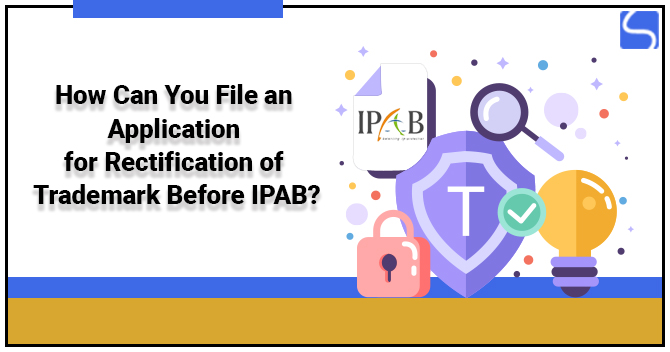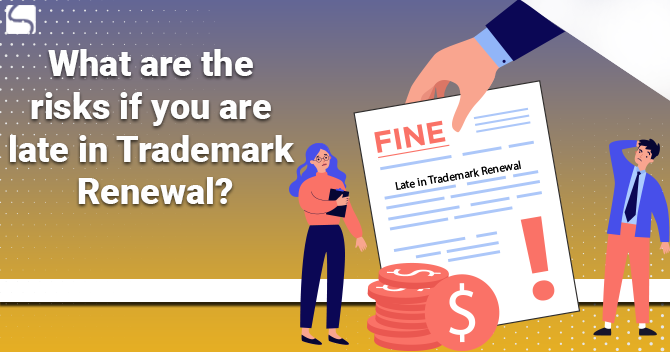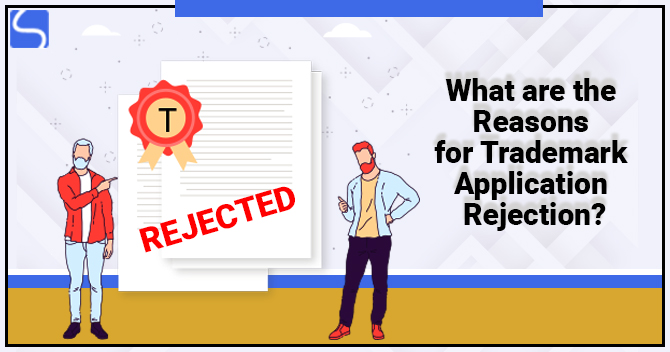How Can You File an Application for Rectification of Trademark Before IPAB?

Karan Singh | Updated: Jul 09, 2021 | Category: Trademark
As per the Trade Marks Act, 1999, a Trademark is a mark, logo, name, or word used to differentiate the products/goods and services of one company from another company in the market. It can be compared to a distinctive birthmark. The dissimilarity of a Trademark can be accomplished by rectification of Trademark using logo, name, letters, word, device, name, numerals, and packaging of goods (3-D shapes, sound, and combination of colours). Trademark helps to:
- Advertise the products;
- Differentiate the goods of the owner from those of others;
- Recognise the origin of goods;
- Guarantee the quality of products.
In this blog, we discuss the process to file an application for Rectification of Trademark before IPAB (Intellectual Property Appellate Board).
Table of Contents
Importance of Trademark Registration
Trademark Registration is the ownership proof of the Trademark. It gives the:
- Owner exclusive right to use the Trademark;
- It safeguards the Trademark from the violation or Trademark Infringement;
- Owner legal rights regarding the Trademark to use the Trademark;
- It permits the owner to enjoy the goodwill linked with the Trademark.
Rectification of Trademark – Meaning
Rectification of Trademark is the legal system to rectify or correct an error or omission that has been made in the Trademark Registration concerning the Trademark. If an omission or error has occurred while Trademark Registration or post-registration, the applicant may himself apply for the rectification of Trademark. But, this does not only comprise an error or correction but also includes changes. The candidate can apply for the rectification of Trademark at a time, whether the mark is incorporated or requires to be registered. The candidate can also apply for the Trademark cancellation. An aggrieved party can file an application for the cancellation/rectification or removal of the registered mark. An aggrieved party means a party whose interests are affected by the Trademark Registration.
Roles and Powers of IPAB (Intellectual Property Appellate Board)
The provisions concerning the IPAB are included in Section 83 to 100 of the Trade Marks Act. The Intellectual Property Appellate Board came into action on 5th September 2003. The intention to create this Board was to adjudicate appeals, hear, to rapidly dispose of the appeals against the decision of the Trademark Registrar under the Indian Trade Marks Act and Indian Geographical Indication of Goods Act, 1999. Intellectual Property Appellate Board is headquartered in Chennai. It has four other branches in Delhi, Kolkata, Mumbai, and Ahmadabad.
The Civil Procedure Code (CPC) doesn’t combine Intellectual Property Appellate Board. Rather Intellectual Property Appellate Board (IPAB) is guided by the principles of Natural Justice. IPAB can control its proceedings. Intellectual Property Appellate Board (IPAB) will have similar powers as that of the Civil Procedure Code, such as the power to receive evidence, to inspect witnesses, ordering to check public records, any other matters. IPAB can also sue for contempt of authority by the public servants and offences under the Public Justice. Intellectual Property Appellate Board (IPAB) shall have the authority to punish if it is providing false evidence. The Chairman has the authority to transfer cases from one bench to another under Section 117-B (Patent Act, 1970)[1]. Similarly, Intellectual Property Appellate Board (IPAB) shall have the authority to frame rules for procedures and the conduct of proceedings and under this Act. According to Section 177-G of the Patent Act, below mentioned cases would be transferred to the Appellate Board:
- Appeals against controller’s order;
- Cases regarding the Patent revocation. This will exclude counterclaim in a suit of infringement rectification of the Register pending before any High Court.
What are the Different Grounds for Rectification of Trademark?
The Trademarks Act (Section 57) provides for grounds of Trademark Rectification of Register.
- Changing the address, contact details or any information of the applicant;
- Application for the removal of registered Trademark if it has not been in use for five years and three months;
- Changing the description or categorisation of products and services or marks;
- Correcting or rectifying the errors made in the application;
- Altering the Trademark Class;
- Modifying the design or any other mark content;
- Correcting information or error entered in the Registrar of Trademark;
- Any other grounds as given by the Trademark Registrar.
Suppose it comes to the notice of the Trademark Registrar that the form includes any omission or falsification. In that case, the Trademark Registrar on their own can also order for the filing of an application for the rectification of Trademark.
Vital Documents Required for the Application of Rectification of Trademark
The application for Rectification of Trademark can be filled by an aggrieved person, owner and Trademark Registrar for rectification of Trademark documents:
- If the process is commenced by an aggrieved person: Form TM-26 along with fees;
- If the process is commenced by owner: Form TM-16 along with the fees;
- If the process is commenced by the Trademark Registrar: Form TM-M along with the fees.
Cancellation or Rectification of Trademark Proceedings by Registry
Once the Trademark Registrars receive the application along with the fees and statement made by the aggrieved party, then the Trademark Registrar serves the application & statement upon the registered owner to file the Counter-Statement (CS). After the Counter-Statement is filed, the matter reaches the evidence stage. Both parties must file the evidence in the affidavit form. The matter is then set for final hearing. Both the parties are permitted the chance to show their case. Based on the merits of the case, the order is made.
Process Followed by IPAB for Cancellation or Rectification of Trademark
The party filing the application is required to submit its case & evidence along with the application. The registered owner also needs to submit evidence with a counter-affidavit. Intellectual Property Appellate Board (IPAB) then appoints for verbal submissions. Based on merit, the order is passed in an appropriate course.
Conditions of Appeal before IPAB
The order of the Trademark Registrar is appealable before IPAB. The appeals have to be filed within three months. An appeal could be admitted after three months if the appellant fulfilled the Board that the reason for the delay is authentic. There is no condition of an appeal against the order passed by the Intellectual Property Appellate Board. But, Writ petitions can be filed in the High Court under Articles 226 & 227 of the Constitution. The Supreme Court can also be approached under Article 136 of the Indian Constitution.
Latest Vital Case Laws on Trademark Law in India

- Jollibee Foods Corporation vs. Chakshu Food Products
Case Facts:
In this matter, a fast-food brand under the “Jollibee” Trademark belonged to the defendant. The wordmark “Jollibee” with the name had the image mark of a bee. The defendant had obtained the Trademark “Jollibee” in the year 2005 but had not used the same till 2017 and had not begun the business in India. The Trademark Registration was on an “Anticipated to be Used Basis”. The appellant used the same mark with the bee image. The defendant was aggrieved by the same and prayed to the Court for an injunction to contain the appellant by the same and requested to the Court for an order to restrain the appellant from using the mark. The Trial Court issued an order to the defendant. The appellant got aggrieved by the order of Trail Court; hence the appellant approached the Delhi High Court.
Observations made by the Court
High Court of Delhi observed that the defendant had not started business in India from 2005 to 2017. The business of both the appellant and defendant was not the same. The defendant was the proprietor of a fast-food chain whereas the appellant was selling packaged spices. The defendant was attentive to the appellant’s business when the appellant required Trademark Registration “Chakshu” with a bee image in November 2016. The defendant had delayed in looking for an ex-parte injunction. Therefore, the Court ruled in the appellant’s favour. Court cited the verdict of the Supreme Court in the case of Milmet Oftho Industries & Others vs Allegan Inc. (2004), where it was held that MNCs would have no right to claim Trademark exclusiveness if they don’t enter or aim to enter in a reasonable time into business in India. Moreover, according to Section 47 of the Trade Mark Act, a Trademark can be removed from the Register on the levels of Non-Use of Trademark.
- Baby Gift House & Ors. Vs DM Entertainment
W already knows about the famous singer in India, Daler Mehendi from Punjab. A company was registered to manage the careers of pop stars. The company had all titles, right, and interests in the pop-star with the Trademark Daler Mehendi. The business of the respondent was to make small toys. The company of respondents manufactured toys of Daler Mehendi and crashed on his popularity. The petitioner Daler Mehendi was aggrieved with the same and filed a suit for permanent injunction in the Court. The petitioner’s suit was that the defendant company was taking benefit of the popularity of the petitioner. Neither had the petitioner given any power or any license to use the petitioner’s reputation regarding products or services linked with the petitioner. Therefore, this would lead to passing off. The petitioner stated that this use was done without consent from the petitioner, and the purpose was commercial gain. This constituted a violation of the petitioner’s right to publicity.
Passing off occurs when a mark is confusingly similar to the mark of another; however, it is intentionally used to create misunderstanding in the customer’s minds that results in the loss or harm of business of the legal Trademark owner. A distinctive example is character merchandising which is yet to be fully explored in India. In this case, the Court ruled in the petitioner’s favour and ordered a compensation amount of Rupees one lakh to the petitioner.
- Akash Arora & Anr vs Yahoo Inc.
Facts of the Case
In this matter, the plaintiff owned the Trademark “Yahoo” and the domain name “Yahoo.com”. The respondent tried to use the same name, “Yahooindia.com“, and went ahead & incorporated the same. The petitioner contended that the names were nearly similar or would confuse the internet user that the name had an ordinary source of connection.
Court Observations
The Court said that the name Yahoo had acquired distinctiveness and uniqueness & it didn’t matter that “Yahoo” was a dictionary word. The domain name using “yahooindia.com” by the respondent. Therefore, the Court permitted the order to be discontinued. The Court held that a domain name served the same purpose as a Trademark, and hence, a domain name was eligible to equal protection like a Trademark. In Cyberbooth & Anr vs Rediff Communication (2000), the High Court of Bombay observed the significance & value of a domain name and mentioned that a domain name is like a company’s corporate asset.
Conclusion
To prevent cancellation, removal, or rectification of Trademark proper precautions need to be taken, for instance, a Trademark requires to be timely renewed; the Trademark should be active, which means five years and three months shouldn’t have passed before the Trademark is used; nothing must be done which destroys the Trademark uniqueness.
It is essential to remember that on 4th April 2021, the Indian President encourages the Tribunal Reforms (Rationalisation and Conditions of Service) Ordinance 2021, hereby cancelling IPAB. This has been done by making changes to the Patent Act, 1970, the Trademarks Act, 1999, the Copyright Act, 1957, and the Geographical Indication of Goods Act, 2000. According to the ordinance, the pending matters before the IPAB will be transferred to the significant High Court. The High Court may either proceed further with the cases from the step at which they were initial state or before the transfer as it considers fit. According to the reports, the main reason for the ordinance was the slow justice delivery of IPAB. The IPAB has been working for the last eighteen years, which will make it hard for High Courts to take up the extra responsibility. It needs to be seen how the Indian Government will deal with the problems of pending vast volumes of cases from IPAB to the High Court.
Read our article:Will it be viewed as a Violation of Trademark norms if Your Trademark is being used by Someone Else?














